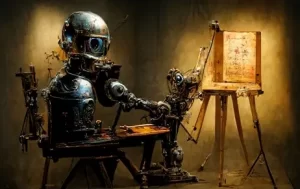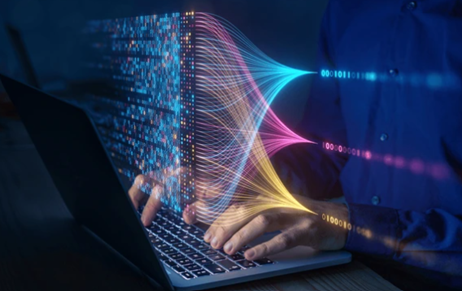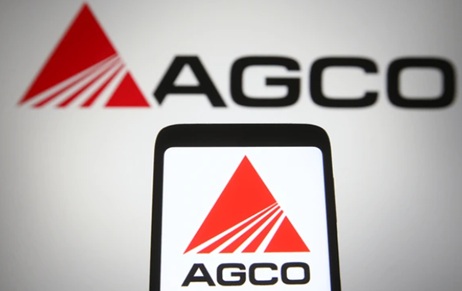Biotechnology is one of the High-Tech industry with innovation and progress in the field of…
Artificial intelligence and Intellectual Property : How to Protect AI-Generated Creations and inventions
Preface
Artificial intelligence (AI) is rapidly becoming a part of our daily lives, with self-driving cars, autonomous weapons, and various services relying on AI systems to varying extents. Artificial intelligence has fundamentally changed how we live and work, developments in machine learning and processing of natural language have given rise to ever-more complex AI systems. These systems can produce unique works and inventions, in recent years tools like DALL-E, the idea of artificial intelligence (AI) and its consequences for intellectual property have drawn a lot of attention. One area of debate in the field of AI is the issue of AI-generated Arts and Inventions and how to determine ownership of such arts and inventions under Intellectual Property laws. The issue of how to protect AI-generated ideas and creations in India has grown in importance as the usage of AI grows more pervasive and advanced. The consequences of AI for intellectual property will be covered in this article, along with possible solutions in the Indian context.
Laws Governing IP in India
The Indian Copyright Act, 1957, which protects literary, theatrical, musical, and creative works, governs intellectual property in India. The Act, however, doesn’t speak directly to the problem of AI-generated works and innovations. Due to this, there is uncertainty over what counts as a “creative” work and whether or not AI-generated innovations and works should be protected. Because they are not considered to be “original” works written by a human author, AI-generated works have occasionally been refused copyright protection. For instance, an Australian court recently ruled in the case of Acohs Pty Ltd v. Ucorp Pty Ltd,[1][2012] FCAFC 16 that a computer-generated work could not be covered by copyright since it was not created by a human.
[Image Sources : PC Mag Dot Com]

The Indian Copyright Rules, 2013, have also been amended to emphasize that, in cases involving “computer-generated works,” the author is understood to be the one who makes the arrangements required for their creation. This clause makes it clear that any work produced by an AI system should be credited to the person who designed or programmed it. This indicates that the person who created or programmed an AI system is the one who is in possession of the intellectual property rights of the work produced by the AI.
Furthermore, it is important to consider the ethical implications of AI-generated works and inventions. AI technology has the potential to create a new form of intellectual property, which may not be subject to existing laws and regulations. This raises questions about the ethical implications of creating and owning AI-generated works and inventions.
For example, who is responsible for ensuring that AI-generated works and inventions are used ethically and do not infringe on existing intellectual property rights? Are the creators of AI systems liable for any potential ethical violations? In addition, should AI-generated works and inventions be subject to the same laws and regulations as other forms of intellectual property?
These questions are important to consider when discussing who has intellectual property rights over AI-generated works and inventions in India. It is clear that the creator or programmer of an AI system is the one who holds the intellectual property rights over the AI-generated works and inventions. However, it is also important to consider the ethical implications of AI-generated works and inventions, and whether or not existing laws and regulations are sufficient to protect them.
The Indian government has taken some steps to address these issues. For example, the Indian Copyright Act, 1957, has been amended to provide that where “computer-generated works” are concerned, the author shall be taken to be the person who makes the arrangements necessary for their creation. This provision clarifies that the creator or programmer of an AI system should be considered the author of any work generated by that system.
In addition, the Indian Patent Act, 1970, includes a provision that states that inventions must be “new” and “involve an inventive step”. This provision has been interpreted to include inventions that are derived from AI systems, provided that the invention is genuinely novel and involves some degree of creative effort. This provides some protection for AI-generated inventions, although it is still unclear as to what degree of protection is provided. The Indian government has also taken steps to address the issue of AI and IP. In 2018, the Indian Patent Office released guidelines on the patentability of inventions involving AI, stating that such inventions may be eligible for protection as long as they meet the usual requirements for novelty, non-obviousness, and usefulness. The guidelines also provide that the inventor of an AI-related invention may be a natural person or a legal entity, potentially opening the door for AI systems to be considered inventors.
The Indian Trademarks Act, 1999, provides that a trademark must be “distinctive” in order to be eligible for protection. This provision has been interpreted to include AI-generated trademarks, provided that they are “distinctive” in nature. This provides some protection for AI-generated trademarks, although the extent of protection provided is still unclear.
One potential solution to this problem is to adopt a “modified joint authorship” model for AI-generated copyrightable works. Under this model, both the AI system and the person who trained or programmed it would be considered co-authors of the work, with the AI system being the “author” for purposes of copyright protection. This approach has been endorsed by the Delhi High Court in the case of Indian Performing Rights Society Limited v. Sanjay Dalia & Ors, (2015) (1) CHN 572[3], in which the court held that the person who programmed an AI system to generate music was entitled to be recognized as a co-author of the resulting works.
For AI-generated inventions, the Indian Patents Act provides some guidance on who can be considered the inventor of an invention. According to the Act, an inventor is defined as “the actual deviser of the invention.” While this definition does not explicitly exclude AI systems from being considered inventors, it could be interpreted to mean that only a natural person can be an inventor. In this case, it may be necessary to adopt a modified joint inventorship model similar to the one discussed above, in which both the AI system and the person who trained or programmed it are considered co-inventors of the invention.
Conclusion
In conclusion, the implications of AI for intellectual property in India are complex and still somewhat unclear. However, it is clear that the creator or programmer of an AI system is the one who holds the intellectual property rights over the AI-generated works and inventions, including copyright, patent, and trademark. It is also important to consider the ethical implications of AI-generated works and inventions, and whether or not existing laws and regulations are sufficient to protect them. As AI continues to advance and become increasingly capable of generating original creations and inventions, it is important to consider how to protect these works under IP laws in India. While the current legal landscape is somewhat uncertain in this regard, adopting a modified joint authorship or inventorship model could be a useful way to ensure that both the AI system and the person who trained or programmed it are fairly compensated for their contributions. It will also be important to continue to monitor the development of guidelines and case law in this area, in order to ensure that IP laws in India keep pace with the rapid developments in the field of AI.
Author : Khushwant Nimbark, 3rd year Student of the Rajiv Gandhi National University of Law, Punjab, in case of any queries please contact/write back to us via email to chhavi@khuranaandkhurana.com or at IIPRD.
References
1. Who Will Own An AI Generated Work? – Patent – India “Who Will Own An AI Generated Work? – Patent – India”. Mondaq.Com, 2023, https://www.mondaq.com/india/patent/1185940/who-will-own-an-ai-generated-work. Accessed 10 Jan 2023.
2. Who owns the copyright in AI-generated art? “Who Owns The Copyright In AI-Generated Art?”. Lexology, 2023, https://www.lexology.com/library/detail.aspx?g=fd1e9201-c746-42b4-b3c2-348dfe7ea31d. Accessed 10 Jan 2023.
3. CTC, F. CTC, Faye. “AI Generated Art – Who Owns The Rights? – Trademark Lawyer Magazine”. Trademark Lawyer Magazine, 2022, https://trademarklawyermagazine.com/ai-generated-art-who-owns-the-rights/#:~:text=If%20there%20is%20no%20human,that%20prompt%20is%20the%20author. Accessed 10 Jan 2023.
[1] Acohs Pty Ltd v Ucorp Pty Ltd [2012] FCAFC 16.
[2] Appeal (civil) 6472 of 2004 Eastern Book Company & Ors vs D.B. Modak & Anr.
[3] (2015) (1) CHN 572



